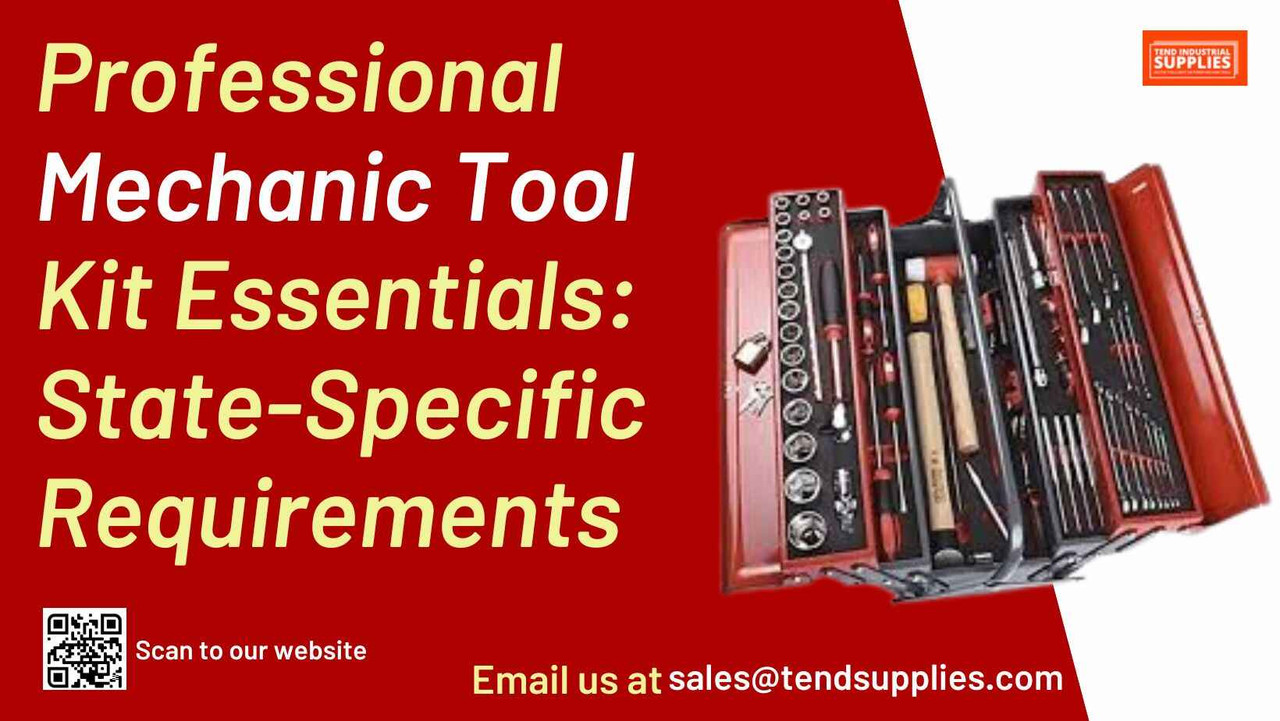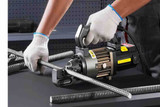Professional Mechanic Tool Kit Essentials: State-Specific Requirements
Key Takeaways
- Tool requirements vary by state certification standards
- Professional certifications demand specific tool qualities
- Regional weather affects tool selection and maintenance
- Safety regulations influence tool kit composition
- Warranty requirements differ by state
Introduction
A professional mechanic tool kit is key to any mechanic’s success, but it’s not a one-size-fits-all solution. Across the United States, varying climate conditions, industry demands, and state-specific safety regulations all influence the selection of essential tools. A well-curated tool kit doesn’t only enable efficient work but also ensures compliance with local standards and industry practices. From Texas’s automotive repair shops that need heat-resistant and durable tools to New York’s urban garages where compact, space-saving equipment is critical, each state has unique needs.
In this guide, we delve into the essential tools every mechanic should have, covering everything from basic hand tools to advanced diagnostic equipment. We’ll explore how state-specific requirements impact tool choices, from safety considerations and environmental factors to industry preferences. Whether you’re an experienced mechanic looking to upgrade or a newcomer assembling your first professional kit, this guide will help you choose the best tools that align with both your work needs and local regulations.
State Certification Requirements
Northeastern State Standards
In states like New York, Massachusetts, and Pennsylvania, professional mechanics must maintain tool kits that meet strict certification requirements. These states emphasize:
Mandatory Tool Categories:
- ASE-certified compatible tools
- State-approved diagnostic equipment
- Environmental compliance tools
- Safety-rated hand tools
Special Considerations:
- Rust-resistant finishes for humid conditions
- Salt-air corrosion protection
- Indoor storage requirements
- Annual certification checks
Southern Region Requirements
Florida, Texas, Georgia, and other southern states focus on:
Climate-Specific Tools:
- Heat-resistant handle materials
- Corrosion-resistant finishes
- UV-protected storage solutions
- Enhanced grip materials for humidity
Certification Requirements:
- State board-approved diagnostic tools
- Hurricane-rated storage systems
- Specialized AC service tools
- Heat-tolerant measurement tools
Midwestern Standards
Illinois, Michigan, Ohio, and surrounding states require:
Weather-Adapted Tools:
- All-weather storage solutions
- Thermal-protected diagnostic equipment
- Ice-resistant metal finishes
- Enhanced grip for cold conditions
Professional Standards:
- Industry-specific certifications
- Regular calibration records
- Temperature monitoring systems
- Winter-rated storage units
Western Region Compliance
California, Oregon, and Washington emphasize:
Environmental Considerations:
- CARB-compliant diagnostic tools
- Eco-friendly cleaning solutions
- Recyclable storage components
- Energy-efficient power tools
Seismic Requirements:
- Secured storage systems
- Anti-tip tool boxes
- Earthquake-rated organization
- Mobile unit securing methods
Essential Tool Categories
Hand Tools Collection
Basic Hand Tools:
- Wrenches
- Combination sets (8mm-32mm)
- Torque wrenches (10-250 ft-lbs)
- Adjustable wrenches (6"-12")
- Impact socket sets
- Screwdrivers
- Precision sets
- Impact-rated drivers
- Torx sets
- Security bit collections
Professional Diagnostic Equipment
Modern Requirements:
- OBD-II scanners
- Multimeters
- Pressure testers
- Battery analyzers
Regional Certifications:
- State-approved calibration
- Environmental ratings
- Safety certifications
- Update capabilities
Specialty Tools
Vehicle-Specific Tools:
- Manufacturer-specific tools
- Special service tools
- Calibration equipment
- Programming interfaces
Professional Storage Solutions
Tool Organization Systems
Professional Requirements:
- Inventory tracking systems
- Security features
- Climate control
- Mobility options
Storage Specifications:
- Weight capacity ratings
- Drawer load limits
- Security certifications
- Environmental protection
Quality Standards and Warranties
Tool Quality Requirements
Professional Grade Standards:
- ISO certification compliance
- ANSI/ASME specifications
- Material grade requirements
- Finish requirements
Warranty Considerations:
- State-specific coverage
- Professional use ratings
- Replacement procedures
- Service center locations
Regional Tool Maintenance
Climate-Specific Care
Coastal Regions:
- Corrosion prevention
- Salt air protection
- Humidity control
- UV protection
Northern Regions:
- Cold weather storage
- Thermal protection
- Moisture control
- Rust prevention
Budget Planning and Investment
Professional Kit Investment
Initial Investment Range:
- Entry-level professional: $5,000-$8,000
- Mid-range professional: $10,000-$15,000
- Master technician: $25,000-$50,000+
Long-term Considerations:
- Upgrade schedules
- Replacement costs
- Maintenance budgets
- Insurance requirements
Safety Compliance
OSHA Requirements
Basic OSHA Safety Standards:
- Tool condition requirements
- Storage regulations
- Usage guidelines
- Maintenance records
State-Specific Rules:
- Local safety codes
- Industry regulations
- Certification requirements
- Inspection schedules
Frequently asked questions
1. How often should professional tools be calibrated?
Calibration requirements vary by state and tool type, but generally every 6-12 months for precision tools.
2. What warranty coverage is required for professional tools?
Professional tools should carry minimum 1-year warranties, with lifetime warranties preferred for hand tools.
3. Are specific tool brands required for state certification?
While specific brands aren't usually required, tools must meet professional grade standards and certifications.
4. How should tools be stored in extreme weather conditions?
Climate-controlled storage with proper humidity regulation is recommended, especially in coastal or extreme temperature regions.
5. What documentation should be maintained for professional tool kits?
Maintain calibration records, warranty information, purchase receipts, and inspection logs for certification purposes.
Related Articles
- Essential Mechanic Tool Kits for New Jersey's DIY Auto Enthusiasts
- Best Practices for Tool Maintenance in Maryland's Humid Climate
- Professional-Grade Hand Tools Guide
- Top 10 Must-Have Tools for Professionals
Conclusion
Ensure your professional mechanic tool kit meets all regional requirements and professional standards. Contact Tend Industrial Supplies for expert guidance on building or upgrading your professional tool collection.
Contact us today:
- Email: sales@tendsupplies.com
- Visit: www.tendsupplies.com
- Browse our professional tool collection
Don't risk non-compliance or inefficiency with inadequate tools. Let our experts help you build a professional tool kit that meets all regional requirements while maximizing your productivity and capabilities.









